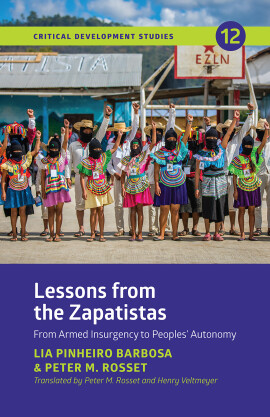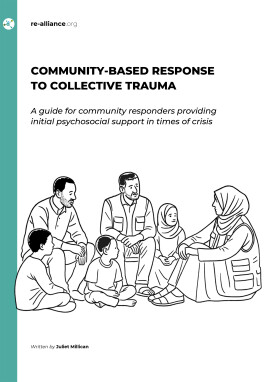
Development Practitioners in Action
What does a development practitioner look like? Located within deliberative development paradigms, this book addresses this question by examining some of the key attributes, behaviours and character dispositions of development practitioners. Such mentality and behaviours enable development practitioners to effectively co-design and co-create lasting development interventions with and alongside people.
This important book is rooted in field practices from KwaZulu-Natal to the Kalahari, from Eastern Cape to Gippsland. It is coloured by practical experiences in public health, community theatre, agriculture extension, rural business development and participatory action research.
The treatise contends that central to the work of a development practitioner is the ability to see and hear people, and also to use people’s wisdom in translating and applying development knowledge. Linje Manyozo proposes a pedagogy of seeing: of empathy and feeling as the foundation stone for capacitating development practitioners to be more humane, compassionate, understanding and to exercise a certain level of indigenous intelligence beyond their formal training.
The treatise is not a field guide on how to do community participation; rather, it is about enriching development fieldworkers with a supplement to the formal training. People’s wisdom is about opening up a practitioner's heart to see, feel and share the people’s perspective in co-curating lasting development solutions.
Published: 2023
Pages: 150
eBook: 9781788532167
Paperback: 9781788532150
Hardback: 9781788532143
This important book is rooted in field practices from KwaZulu-Natal to the Kalahari, from Eastern Cape to Gippsland. It is coloured by practical experiences in public health, community theatre, agriculture extension, rural business development and participatory action research.
The treatise contends that central to the work of a development practitioner is the ability to see and hear people, and also to use people’s wisdom in translating and applying development knowledge. Linje Manyozo proposes a pedagogy of seeing: of empathy and feeling as the foundation stone for capacitating development practitioners to be more humane, compassionate, understanding and to exercise a certain level of indigenous intelligence beyond their formal training.
The treatise is not a field guide on how to do community participation; rather, it is about enriching development fieldworkers with a supplement to the formal training. People’s wisdom is about opening up a practitioner's heart to see, feel and share the people’s perspective in co-curating lasting development solutions.
| 1. Development practitioners in action | |||
|---|---|---|---|
| 2. Teacher, teach me to see | |||
| 3. On empathy for the other | |||
| 4. On organic feminism | |||
| 5. On theatre, trauma and forgiveness | |||
| 6. On leadership | |||
| 7. Wisdom of water |
‘It has taken us ages to ask the elusive question - 'who is a development practitioner'? Linje Manyozo has, provokingly, responded. Cogently presented, this is an incredible piece of work, laying bare the subtleties of development discourses. Linje, you are a true development practitioner.’
Jonathan Makuwira, Professor of Development Studies and Deputy Vice Chancellor, Malawi University of Science and Technology
‘Nothing is more compelling than a human drama presented in a comedic way. Development practitioners would rather listen and watch than read. But for this book, reading becomes a joyful experience as you encounter the wisdom shaped by honest mistakes and lessons learned.’
Cleofe Torres, Development Communication Practitioner
‘In this enlightening book, Linje Manyozo leads us into a voyage from expertise to ''human-tise''. Combining his passion for people with the praxis of participatory development and his lifelong practice of working and listening to communities, Linje invites development practitioners and experts alike to be in service to the communities they are working for and get involved in a development that as his great-grand mother once said, is felt in the heart.’
Guy Bessette, participatory development researcher
‘A comprehensive and pragmatic book that considers a more philosophical approach to understanding the value and role played by the development practitioner. Linje Manyozo offers a personal account and academic lessons into the field of development by providing hands-on suggestions for a more transformed and grounded practitioner. This superb guide is well written and offers an easy account of the message for all interested in achieving a desired development. This book comes highly recommended for academics, practitioners and intellectuals alike.’
Amanda van den Berg, Senior Lecturer and Academic Coordinator, Nelson Mandela University
Communication for Development Scholar and Practitioner, College of Design and Social Context, RMIT University, Melbourne, Australia and Research Associate of the Department of Development Studies, Nelson Mandela University, South Africa.
Unlearning Communication for Social Change—A Pedagogical Proposition
Tufte, Thomas
Social Sciences, Vol. 13 (2024), Iss. 7 P.335
https://doi.org/10.3390/socsci13070335 [Citations: 2]Cultural Studies with Communities in South Africa: Implications for Participatory Development Communication and Social Change Research
Dyll, Lauren
Tomaselli, Keyan G.
Social Sciences, Vol. 13 (2024), Iss. 11 P.614
https://doi.org/10.3390/socsci13110614 [Citations: 2]Using participatory art-based methods to explore experiences and practices in sexual and reproductive health
Govender, Eliza
Nota, Phiwe Babalo
Gumede, Mpume
Ngubane, Nqobile
Methods in Psychology, Vol. 11 (2024), Iss. P.100160
https://doi.org/10.1016/j.metip.2024.100160 [Citations: 3]




